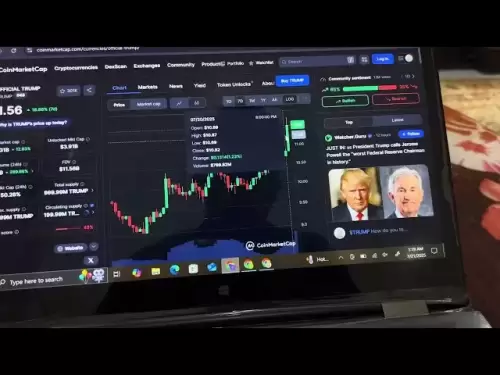-
 Bitcoin
Bitcoin $118400
0.39% -
 Ethereum
Ethereum $3814
2.17% -
 XRP
XRP $3.547
1.34% -
 Tether USDt
Tether USDt $1.000
0.00% -
 BNB
BNB $769.5
2.95% -
 Solana
Solana $191.7
6.36% -
 USDC
USDC $0.9999
0.01% -
 Dogecoin
Dogecoin $0.2722
7.75% -
 Cardano
Cardano $0.8995
5.59% -
 TRON
TRON $0.3158
-0.78% -
 Hyperliquid
Hyperliquid $47.37
4.46% -
 Stellar
Stellar $0.4848
3.54% -
 Sui
Sui $4.031
1.72% -
 Chainlink
Chainlink $20.11
3.94% -
 Hedera
Hedera $0.2832
3.16% -
 Avalanche
Avalanche $26.20
4.27% -
 Bitcoin Cash
Bitcoin Cash $530.5
0.67% -
 Shiba Inu
Shiba Inu $0.00001568
3.59% -
 Litecoin
Litecoin $118.4
1.42% -
 UNUS SED LEO
UNUS SED LEO $8.976
-0.23% -
 Toncoin
Toncoin $3.349
2.54% -
 Polkadot
Polkadot $4.590
2.54% -
 Uniswap
Uniswap $10.56
-0.59% -
 Ethena USDe
Ethena USDe $1.001
0.00% -
 Monero
Monero $327.7
0.39% -
 Pepe
Pepe $0.00001422
2.62% -
 Bitget Token
Bitget Token $4.973
-1.22% -
 Dai
Dai $1.000
0.02% -
 Aave
Aave $331.9
1.59% -
 Bittensor
Bittensor $429.6
-0.56%
Bitcoin futures vs spot trading, what's the difference?
Bitcoin futures allow traders to speculate on Bitcoin's price without owning the asset, using leverage and standardized contracts on exchanges like CME or Binance Futures.
Jul 21, 2025 at 01:07 pm
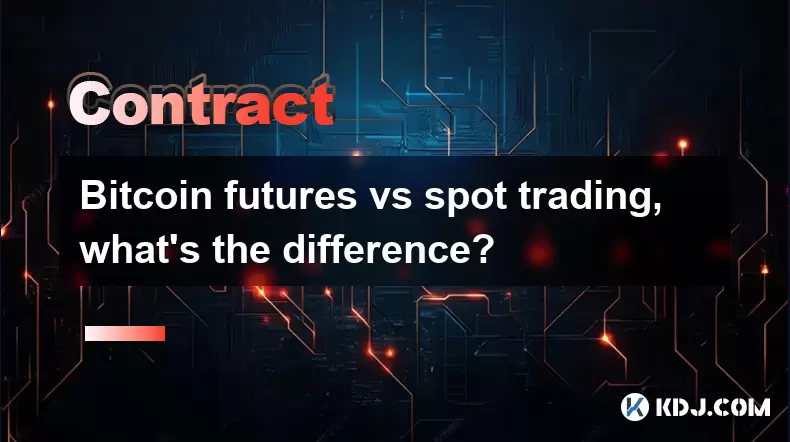
Understanding Bitcoin Futures Trading
Bitcoin futures trading involves entering into contracts to buy or sell Bitcoin at a predetermined price on a specified future date. Unlike owning the actual cryptocurrency, futures contracts derive their value from the underlying asset — in this case, Bitcoin. Traders use futures contracts to speculate on price movements without holding the physical asset.
One of the key features of Bitcoin futures is leverage, which allows traders to control a larger position with a smaller amount of capital. While this can amplify profits, it also increases the risk of significant losses. Futures are often traded on regulated exchanges like CME (Chicago Mercantile Exchange) and Binance Futures, where contracts are standardized.
Another aspect is the funding rate, which ensures that the price of futures contracts stays close to the spot price. This mechanism is crucial for maintaining market equilibrium and preventing large price discrepancies.
Exploring Bitcoin Spot Trading
Bitcoin spot trading refers to the direct buying and selling of Bitcoin at the current market price, with immediate delivery of the asset. In this type of trading, the transaction is settled "on the spot," hence the name. Traders own the actual cryptocurrency and can store it in wallets or use it for transactions.
Spot trading is typically conducted on cryptocurrency exchanges like Binance, Coinbase, or Kraken, where buyers and sellers match orders in real-time. This form of trading is straightforward and does not involve leverage or contracts. It is often preferred by beginners and long-term investors who want to hold Bitcoin as an asset rather than speculate on its price.
One of the advantages of spot trading is the absence of expiration dates. Unlike futures contracts, which have set settlement dates, spot trades do not expire, allowing traders to hold Bitcoin indefinitely.
Key Differences Between Futures and Spot Trading
Leverage availability is one of the most significant differences between Bitcoin futures and spot trading. Futures allow for leveraged positions, while spot trading requires full payment for the asset. This distinction affects both potential gains and losses.
Ownership of Bitcoin is another critical factor. In spot trading, traders own the actual cryptocurrency and can transfer it to personal wallets. In contrast, futures trading does not involve actual ownership of Bitcoin — only the contract representing its value.
Expiration dates also differentiate the two. Futures contracts have specific expiration dates, after which they are settled. Spot trades, however, do not expire, giving traders the flexibility to hold Bitcoin for as long as they wish.
Market participants also differ. Futures markets often attract institutional investors and professional traders due to the complexity and risk involved. Spot markets tend to be more accessible to retail traders and long-term holders.
Risk and Reward in Bitcoin Futures Trading
Futures trading introduces a higher level of risk due to leverage and margin requirements. Traders must deposit a percentage of the contract's value as margin. If the market moves against the position, a margin call may occur, requiring additional funds to maintain the position.
The potential for liquidation is also present in futures trading. If the account balance falls below the required margin level, the exchange automatically closes the position to prevent further losses.
Despite the risks, futures contracts offer opportunities for hedging and arbitrage. Institutional investors often use them to hedge against price volatility, while traders look for price discrepancies between the futures and spot markets to profit.
Volatility plays a significant role in futures trading. Bitcoin's price can swing dramatically, affecting the value of futures contracts. Traders must monitor the market closely and manage their positions accordingly.
Advantages of Bitcoin Spot Trading
Simplicity and transparency make spot trading an attractive option for many investors. There is no need to understand complex contract terms or manage leverage. Traders can simply buy Bitcoin and hold it in a wallet of their choice.
No risk of liquidation is another benefit of spot trading. Since there's no leverage involved, traders don't face margin calls or forced liquidation of their assets. This makes it a safer option for those who are new to cryptocurrency.
Direct ownership of Bitcoin allows traders to participate in forks, airdrops, and staking opportunities. These benefits are generally not available to futures traders since they do not own the underlying asset.
Additionally, spot trading supports long-term investment strategies. Investors who believe in the future value of Bitcoin can accumulate and hold the asset without worrying about contract expiration or funding rates.
Choosing Between Futures and Spot Trading
Trading goals and risk tolerance should guide the decision between futures and spot trading. Traders looking for short-term gains and willing to take on more risk may prefer futures due to leverage and speculative opportunities.
Those who are interested in owning Bitcoin and using it as a store of value or medium of exchange may find spot trading more suitable. It offers a straightforward way to acquire and hold the asset without the complexities of futures contracts.
Market conditions also influence the choice. In highly volatile markets, futures contracts can provide hedging benefits, while in stable markets, spot trading may offer better value for long-term investors.
Ultimately, understanding both futures and spot trading mechanisms is essential for making informed decisions in the cryptocurrency market.
Frequently Asked Questions
Q: Can I lose more than my initial investment in Bitcoin futures trading?
A: Yes, due to leverage, it's possible to lose more than your initial investment in Bitcoin futures trading. If the market moves against your position and your margin is insufficient, you may face a margin call or even liquidation.
Q: Is spot trading safer than futures trading?
A: Generally, spot trading is considered safer because it does not involve leverage or margin requirements. Traders own the actual asset and are not exposed to the risks associated with futures contracts.
Q: Do futures contracts allow for Bitcoin ownership?
A: No, Bitcoin futures contracts do not grant ownership of the underlying asset. They are agreements to buy or sell Bitcoin at a future date and price, but the trader does not physically hold the cryptocurrency.
Q: Can I trade Bitcoin futures without owning any Bitcoin?
A: Yes, you can trade Bitcoin futures without owning any Bitcoin. The contracts are based on the price of Bitcoin, and no actual ownership of the asset is required during trading.
Disclaimer:info@kdj.com
The information provided is not trading advice. kdj.com does not assume any responsibility for any investments made based on the information provided in this article. Cryptocurrencies are highly volatile and it is highly recommended that you invest with caution after thorough research!
If you believe that the content used on this website infringes your copyright, please contact us immediately (info@kdj.com) and we will delete it promptly.
- Toshi.bet: Leading the Crypto Casino Revolution in Poland 2025
- 2025-07-21 20:30:12
- Tether Gold (XAU₮) Expands: Mobee Indonesia & Tokenized Gold's Rising Tide
- 2025-07-21 20:50:12
- BlockDAG's Launch Access: No Vesting, Maximum Opportunity!
- 2025-07-21 21:30:12
- Altcoin Season Heats Up: Cardano Outperforms After Bitcoin Stabilizes
- 2025-07-21 20:50:12
- BlockchainFX: The 1000X Potential Crypto SHIB and DOGE Holders Are Eyeing
- 2025-07-21 21:30:12
- Delhi High Court and the Curious Case of the Missing ₹50 Coin
- 2025-07-21 21:35:13
Related knowledge
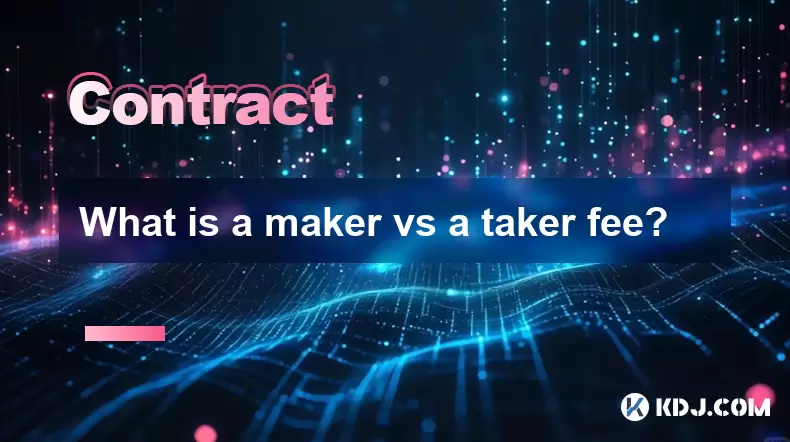
What is a maker vs a taker fee?
Jul 19,2025 at 01:14am
Understanding the Basics of Cryptocurrency Exchange FeesIn the world of cryptocurrency trading, maker vs taker fees are a fundamental concept that eve...

How to analyze Bitcoin futures data from CME?
Jul 19,2025 at 05:22pm
Understanding Bitcoin Futures on CMEBitcoin futures on the CME Group (Chicago Mercantile Exchange) represent a regulated financial instrument that all...
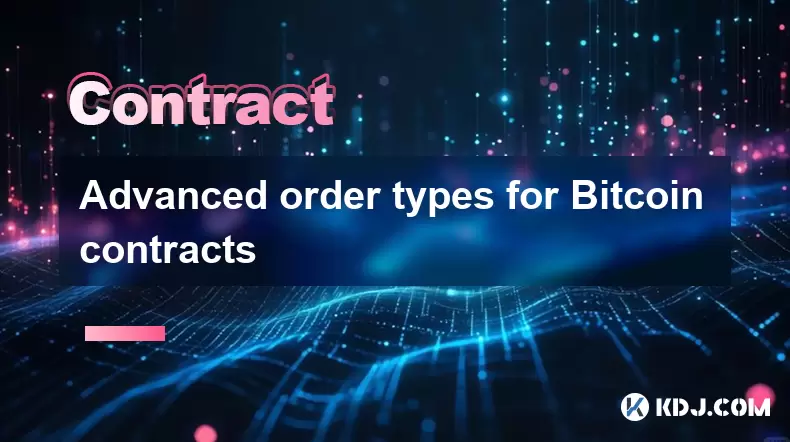
Advanced order types for Bitcoin contracts
Jul 21,2025 at 01:14pm
Understanding Advanced Order Types in Bitcoin ContractsIn the world of Bitcoin futures trading, advanced order types play a crucial role in managing r...
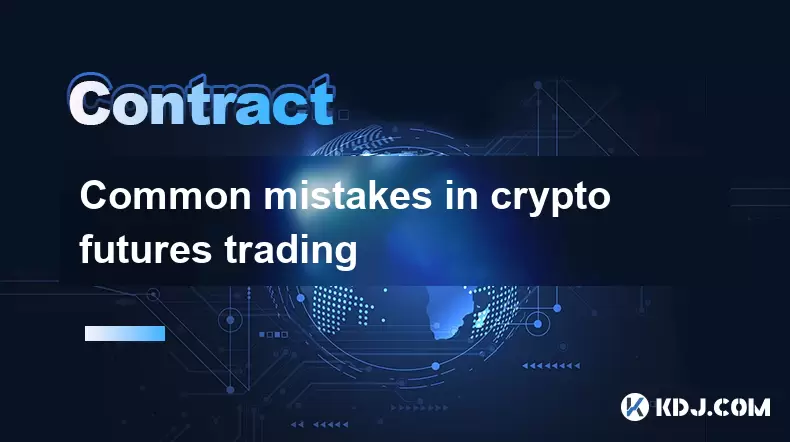
Common mistakes in crypto futures trading
Jul 20,2025 at 09:56pm
Overleveraging Without Risk ManagementOne of the most common mistakes in crypto futures trading is overleveraging. Traders often believe that using hi...
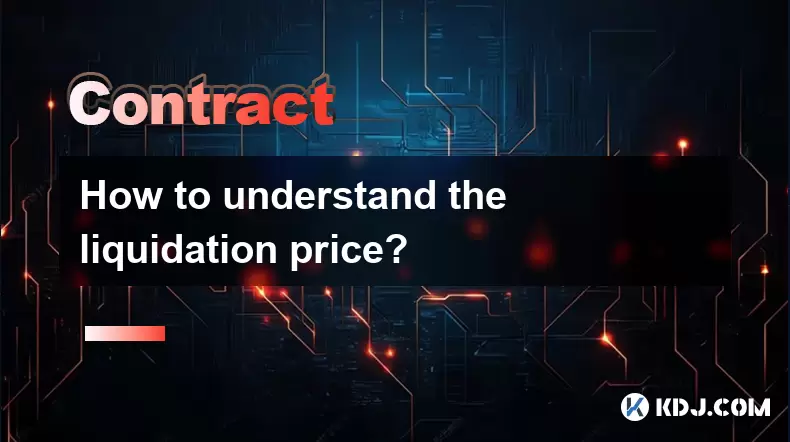
How to understand the liquidation price?
Jul 19,2025 at 10:00pm
What Is a Liquidation Price in Cryptocurrency Trading?In the realm of cryptocurrency futures and margin trading, the liquidation price refers to the s...
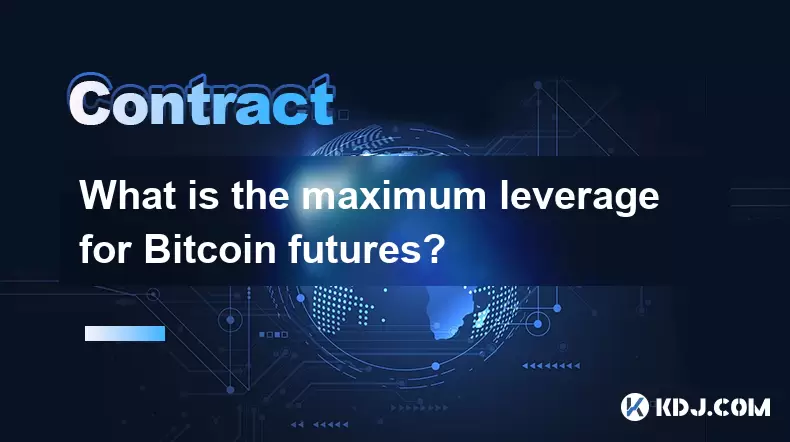
What is the maximum leverage for Bitcoin futures?
Jul 20,2025 at 03:42pm
Understanding Leverage in Bitcoin FuturesLeverage in Bitcoin futures refers to the use of borrowed capital to increase the potential return on investm...

What is a maker vs a taker fee?
Jul 19,2025 at 01:14am
Understanding the Basics of Cryptocurrency Exchange FeesIn the world of cryptocurrency trading, maker vs taker fees are a fundamental concept that eve...

How to analyze Bitcoin futures data from CME?
Jul 19,2025 at 05:22pm
Understanding Bitcoin Futures on CMEBitcoin futures on the CME Group (Chicago Mercantile Exchange) represent a regulated financial instrument that all...

Advanced order types for Bitcoin contracts
Jul 21,2025 at 01:14pm
Understanding Advanced Order Types in Bitcoin ContractsIn the world of Bitcoin futures trading, advanced order types play a crucial role in managing r...

Common mistakes in crypto futures trading
Jul 20,2025 at 09:56pm
Overleveraging Without Risk ManagementOne of the most common mistakes in crypto futures trading is overleveraging. Traders often believe that using hi...

How to understand the liquidation price?
Jul 19,2025 at 10:00pm
What Is a Liquidation Price in Cryptocurrency Trading?In the realm of cryptocurrency futures and margin trading, the liquidation price refers to the s...

What is the maximum leverage for Bitcoin futures?
Jul 20,2025 at 03:42pm
Understanding Leverage in Bitcoin FuturesLeverage in Bitcoin futures refers to the use of borrowed capital to increase the potential return on investm...
See all articles


























